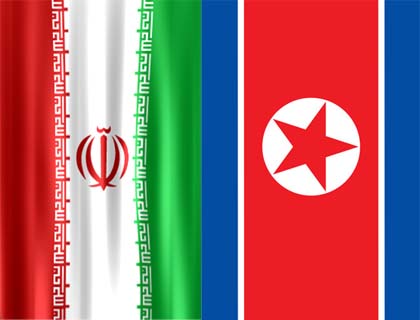NEW YORK– North Korea and Iran appear to have been regularly exchanging ballistic missile technology in violation of U.N. sanctions, according to a confidential United Nations report obtained by Reuters on Saturday.
The report said that the illicit technology transfers had "trans-shipment through a neighboring third country." That country was China, several diplomats told Reuters on condition of anonymity.
The report was submitted to the U.N. Security Council by a U.N. Panel of Experts, a group that monitors compliance with U.N. sanctions imposed on Pyongyang after it conducted two nuclear tests in 2006 and 2009.
The U.N. sanctions included a ban on trade in nuclear and missile technology with North Korea, as well as an arms embargo. They also banned trade with a number of North Korean firms and called for asset freezes and travel bans on some North Korean individuals.
"Prohibited ballistic missile-related items are suspected to have been transferred between the Democratic People's Republic of Korea (North Korea) and the Islamic Republic of Iran on regular scheduled flights of Air Koryo and Iran Air," the report said.
"For the shipment of cargo, like arms and related materiel, whose illicit nature would become apparent on any cursory physical inspection, (North) Korea seems to prefer chartered cargo flights," it said.
It added that the aircraft tended to fly "from or to air cargo hubs which lack the kind of monitoring and security to which passenger terminals and flights are now subject."
Several Security Council diplomats said that China was unhappy about the report.
Beijing has prevented the publication of expert panel reports on North Korea and Sudan in the past. Earlier this week, Russia took similar steps to suppress an equally damning expert panel report on Iran.
The report said the possibility of exports of weapons-grade nuclear material from North Korea or nuclear technology to other countries remains a concern and presents "new challenges to international non-proliferation efforts."
U.S., Israeli and European governments have said that North Korea was helping Syria build a nuclear reactor that Israel destroyed in 2007.
In its report, the panel said that North Korea's uranium enrichment problem, which Pyongyang says is for civilian purposes, is "primarily for military purposes."
It added that North Korea "should be compelled to abandon its uranium enrichment program and that all aspects of the program should be placed under international monitoring."
The report also said there were concerns about safety at North Korea's Yongbyon nuclear complex. It said "safety issues should be discussed an integral part of the denuclearization of (North Korea)."
It added that "reckless decommissioning or dismantlement at Yongbyon could cause an environmental disaster." (Reuters)

